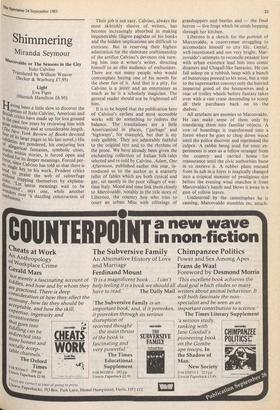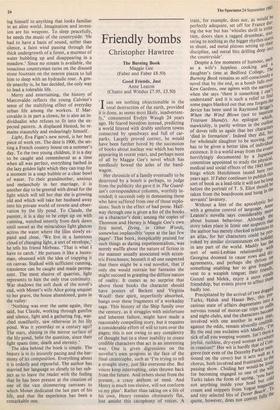Shimmering
Miranda Seymour
Marcovaldo or The Seasons in the City Italo Calvino Translated by William Weaver (Seeker & Warburg £7.95)
Light Eva Figes (Hamish Hamilton £6.95)
aving been a little slow to discover the
H
. genius of halo Calvino, American and rnrilish critics have made up for lost ground „ eat Past few years by reviewing him with -(r.e:t solemnity and at considerable length. roue Neu, York Review of Books devoted suubr f its large pages to his last novel.) His of tleoties are pondered, his conjuring box stories ,alle8orical fantasies, symbolic cities, sines within stories, is forced open and f'ouLlied for its deeper meanings. Forced per- ocr)c!, since Calvino has told us that there is tend key to his work. Prudent critics wilth" t° Praise the web of subterfuge tio °tit trapping themselves by explana-
diosncos'ver‘Ledel. latent meanings wait to be
w nd , says one, while another
c ers over °Illusions., 'a dazzling construction of Their job is not easy. Calvino, always the most skittishly elusive of writers, has become increasingly absorbed in making impenetrable filigree pagodas of his books and the hidden implications are difficult to extricate. But in reserving their highest admiration for the elaborate craftsmanship of the artifice Calvino's devotees risk turn- ing him into a writer's writer, directing himself to an elite audience of enthusiasts. There are not many people who would contemplate buying one of his novels for the sheer fun of it. And that is a pity, for Calvino is a jester and an entertainer as much as he is a scholarly magician. The general reader should not be frightened off him.
It is to be hoped that the publication here of Calvino's earliest and most accessible works will do something to redress the balance. The translations are a little Americanised in places, (`garbage' and `highways', for example), but that is my only quibble. They are admirably faithful to the original text and to the rhythms of the prose. We have already been given the enchanting collection of Italian folk-tales selected and re-told by Calvino. Adam, One Afternoon, published earlier this year, in- troduced us to the author as a masterly teller of fables which are both cynical and gay, set mostly in the poor villages of war- time Italy. Mood and time link them closely to Marcovaldo, notably in the title story of Liberoso, the country boy who tries to court an urban Miss with offerings of
grasshoppers and beetles and — the final horror — live frogs which he sends hopping through her kitchen.
Liberoso is a sketch for the portrait of Marcovaldo, a countryman struggling to accomodate himself to city life. Genial, well-intentioned and not very bright, Mar- covaldo's attempts to reconcile peasant lore with urban existence lead him into comic disasters and Chagall-like fantasies. He can fall asleep on a rubbish heap with a bunch of buttercups pressed to his nose, but a visit to the supermarket conveys only the hurried impartial greed of the housewives and a roar of trolley wheels before fantasy takes over with a vast crane descending to scoop all their purchases back on to the shelves.
All artefacts are enemies to Marcovaldo. He can make sense of them only by translating them into familiar objects. A row of hoardings is transformed into a forest where he goes to chop down wood until the police discover and reprimand the culprit. A rabbit being used for toxic ex- periments is seen as a fellow stranger from the country and carried home for reassurance until the civic authorities burst in to retrieve it. A rubber plant rescued from its tub in a foyer is magically changed into a tropical monster of prodigious size before the evening wind snatches it from Marcovaldo's hands and blows it away in a gust of yellow leaves.
Undeterred by the catastrophes he is causing, Marcovaldo stumbles on, attach- ing himself to anything that looks familiar in an alien world. Imagination and invent- ion are his weapons. To sleep peacefully, he needs the music of the countryside: 'He had to have a basis of sound, softer than silence, a faint wind passing through the thick undergrowth of a forest, a murmur of water bubbling up and disappearing in a meadow.' Since no stream is available, the tenacious countryman turns on the disused stone fountain on the nearest piazza to lull him to sleep with an hydraulic roar. A gen- tle anarchy is, he has decided, the only way to lead a tolerable life.
Merry and entertaining, the history of Marcovaldo reflects the young Calvino's sense of the stultifying effect of everyday urban life among the workers. If Mar- covaldo is in part a clown, he is also an in- dividualist who refuses to fit into the ex- pected pattern. A displaced Hesiod, he re- mains staunchly and endearingly himself.
Light, Eva Figes's new novel, is her best piece of work yet. The date is 1900, the set- ting a French country house on a summer's day. To the two young children, it is a day to be caught and remembered as a time when all was perfect, everything bathed in the lazy golden light which they can trap for a moment in a soap bubble or a clear bowl of water. To their grandmother, anxious and melancholy in her marriage, it is another day to be greeted with dread for the light which will tell her that she is growing old and which will take her husband away into his private world of reverie and obser- vation by the lily pond. To Claude, the painter, it is a day to be crept up on with cunning, watched intently from dark dawn until sunset as the miraculous light glances across the water where the lilies slowly ex- pand and close. 'We live in a luminous cloud of changing light, a sort of envelope,' he tells his friend Mirbeau. 'That is what 1 have to catch.' He pursues it like a hunts- man, obsessed with the idea of trapping it on canvas. Stalked with sufficient cunning, transience can be caught and made perma- nent. The most elusive of quarries, light represents to him the only true continuity. War shadows the soft dusk of the novel's end, with Monet's wife Alice going unquiet to her grave, the house abandoned, guns in the valley: `Nothing was ever the same again, they said, but Claude, working through gunfire and silence, light and a gathering fog, wat- ched steadfastly, saw otherwise in his lily pond. Was it yesterday or a century ago? The stars, shining in the mirror surface of the lily pond, belie the question, since their light spans time, death and eternity.'
The idea behind the book is simple. The beauty is in its leisurely pacing and the har- mony of its composition. Everything about it is orderly and reposeful. The author has married her language so closely to her sub- ject as to leave the reader with the feeling that he has been present at the creation of one of the vast shimmering canvases to which Monet dedicated the last part of his life, and that the experience has been a remarkable one.







































 Previous page
Previous page